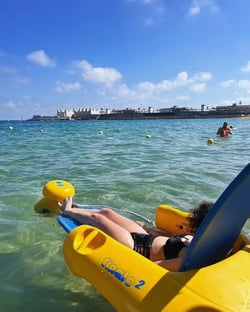“Sometimes in life, you need to hop on the plane and see where it takes you.”
 I repeated these words to ground myself last summer as I prepared for my first international excursion as a wheelchair user. Traveling the world had been a lifelong dream of mine. I remember becoming mesmerized with my grandfather’s old globe as a child. I would endlessly spin it, asking him about his travels and tracing my fingers around countries I wished to visit someday. Yet as a young girl with cerebral palsy, I rarely saw representations of disabled people traveling internationally. I was repeatedly warned that Europe would be difficult and inaccessible to navigate as a wheelchair user. At times, I felt discouraged from my dreams, and I wondered if leaving the country would ever be possible for me.
I repeated these words to ground myself last summer as I prepared for my first international excursion as a wheelchair user. Traveling the world had been a lifelong dream of mine. I remember becoming mesmerized with my grandfather’s old globe as a child. I would endlessly spin it, asking him about his travels and tracing my fingers around countries I wished to visit someday. Yet as a young girl with cerebral palsy, I rarely saw representations of disabled people traveling internationally. I was repeatedly warned that Europe would be difficult and inaccessible to navigate as a wheelchair user. At times, I felt discouraged from my dreams, and I wondered if leaving the country would ever be possible for me.
I never expected the stars to align like they did. After college, I found myself between jobs. Two of my best friends, who doubled as my caregivers, also had extended time to travel. In a surreal moment, I realized that this opportunity may not come again. My friends and I ended up laughing, shrugging our shoulders, and saying to ourselves, “Why not?” as we spontaneously booked plane tickets for a 9-day excursion to Barcelona. I internally questioned whether I had lost my mind. I had no experience in navigating a foreign country with a language barrier. We had only a couple months to plan after booking the tickets, so we started to research strategies for navigating the inaccessibility that we were bound to encounter while abroad.
In retrospect, I focused too much of my planning on the worst-case-scenarios that I could face as a disabled traveler. I expected challenges and struggles at every turn. I told myself that if this voyage ended in disaster, I may have to let go of my dream of international travel. Nothing could have prepared me for the liberation and exhilaration that I experienced in Barcelona.
To say that it was the trip of a lifetime is an understatement! My friends and I explored cathedrals, castles, and mansions and marveled at breathtaking skyline views and mountain peaks. We ate seafood, drank sangria, and danced to Catalan music. We wandered aimlessly around plaças, side streets, and alleyways, as we soaked in the vibrant city. In a peak moment of the trip, I swam in the Mediterranean Sea using an aquatic wheelchair, immersing myself in the water in a way I never imagined was possible.
We fell in love with the culture of openness and acceptance in Barcelona. Accessibility and inclusiveness were the unspoken norms, beyond what I have experienced as a disabled woman in America. We were guided down wheelchair-friendly routes at different historic sites and enjoyed spontaneous conversations with locals who helped us without any hesitation. I felt stunned by how many strangers spoke directly to me, as opposed to ignoring me and talking to my able-bodied friends. I engaged in countless conversations, and I laughed at how terribly my augmentative communication device pronounced Spanish words. We stayed with the most considerate and inclusive Airbnb hosts, who went out of their way to ensure that their apartment met my accessibility needs.

 I repeated these words to ground myself last summer as I prepared for my first international excursion as a wheelchair user. Traveling the world had been a lifelong dream of mine. I remember becoming mesmerized with my grandfather’s old globe as a child. I would endlessly spin it, asking him about his travels and tracing my fingers around countries I wished to visit someday. Yet as a young girl with cerebral palsy, I rarely saw representations of disabled people traveling internationally. I was repeatedly warned that Europe would be difficult and inaccessible to navigate as a wheelchair user. At times, I felt discouraged from my dreams, and I wondered if leaving the country would ever be possible for me.
I repeated these words to ground myself last summer as I prepared for my first international excursion as a wheelchair user. Traveling the world had been a lifelong dream of mine. I remember becoming mesmerized with my grandfather’s old globe as a child. I would endlessly spin it, asking him about his travels and tracing my fingers around countries I wished to visit someday. Yet as a young girl with cerebral palsy, I rarely saw representations of disabled people traveling internationally. I was repeatedly warned that Europe would be difficult and inaccessible to navigate as a wheelchair user. At times, I felt discouraged from my dreams, and I wondered if leaving the country would ever be possible for me. 